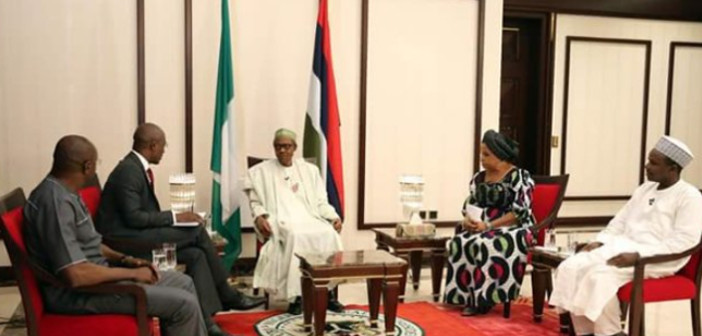President Muhammadu Buhari on Monday admitted that the poor power situation in the country was nothing to laugh about.
The president, however, pledged his administration’s readiness to tackle the situation within the remaining three years available to him as the nation’s leader.
Specifically, he promised that his government would target 10,000MW generation in three years.
Buhari dropped the disclosure while delivering a keynote address at the opening of the National Economic Council’s economic retreat held in the old Banquet Hall of the Presidential Villa, Abuja.
The two-day event has “Nigerian states: Multiple centres of prosperity” as its theme.
Buhari observed that the poor state of power supply in the country had remained a butt of jokes among Nigerians, promising to change the story.
He regretted that although the power sector had been privatised, it had yet to show any improvement in the quality of service.
He said, “Nigerians’ favourite talking point and butt of jokes is the power situation in our country. But ladies and gentlemen, it is no (longer) laughing matter. We must, and by the grace of God, we will put things right.
“In the three years left for this administration, we have given ourselves the target of 10,000MW distributable power. In 2016 alone, we intend to add 2,000MW to the national grid.
“This sector has been privatised but has yet to show any improvement in the quality of service.”
The President listed some of the common public complaints in the power situation to include constant power cuts destroying economic activities and affecting quality of life; high electricity bills despite power cuts; and low supply of gas to power plants due to vandalism by terrorists.
He noted that while the problems defied successive governments, his administration in its determination to change, would put a stop to power shortages.
Buhari said his administration was facing a dilemma in the privatisation programme initiated by the past administration.
This notwithstanding, he said his government would complete the process.
He added, “We are facing the classic dilemma of privatisation: Public interest vs profit motive.
“Having started, we must complete the process. But the National Electricity Regulatory Commission, the regulatory authority, has a vital job to ensure consumers get value for money and overall public interest is safeguarded; government to fast-track completion of pipelines from gas points to power stations and provide more security to protect gas and oil pipelines.
“Power companies should be encouraged to replace obsolete equipment and improve the quality of service and technicians.”
Buhari noted that if urgent steps were not taken, the electoral promise of the All Progressives Congress to build one million housing units in a year would turn out to be a tall order.
To be able to fulfil the promise, the President said the Federal Government must be able to build 250,000 units while the 22 states, being governed by the party, must also build 250,000 units.
He added that foreign investors, together with big construction companies, would then be encouraged to provide the balance.
He stated, “Some estimates put Nigeria’s housing deficit at about 16 milliom units.
“We invite foreign investors together with local, domiciled big construction companies to enter into commercial housing building to pick up the rest.”
Buhari listed the three most frequent public concerns brought to his attention in the housing sector to include severe shortage of housing; high rents and unaffordable prices for prospective buyers, especially middle and low-income earners.
He added that he was aware that red tape, corruption and plain public service inefficiency led to long delays in obtaining ownership of title documents while there were no long-term funding sources for mortgage purposes.
On agriculture, Buhari said both the peasant and the mechanised farmers agreed with the general public that food production and self-sufficiency required urgent government action.
He regretted that for too long, government policies on agriculture had been half-hearted and inconsistent.
He said, “Yet, our real wealth is in farming, livestock, hatcheries, fishery, horticulture and forestry.
“From the information available to me, the issues worrying the public today are rising food prices, such as maize, corn, rice and garri; lack of visible impact of government presence on agriculture; and lack of agricultural inputs at affordable prices.
“Cost of fertilisers, pesticide and labour compound the problems of farming. Extension services are virtually absent in several states.
“Imports of subsidised food products such as rice and poultry discourage the growth of domestic agriculture.
“Wastage of locally-grown foods, notably fruit and vegetables, which go bad due to lack of even moderate scale agro-processing factories and lack of feeder roads.
“These problems I have enumerated are by no means exhaustive and some of the solutions I am putting forward are not necessarily the final word on our agricultural reform objectives.”
He added, “When I was a schoolboy in the 1950’s, the country produced one million tons of groundnuts in two successive years. The country’s main foreign exchange earners were groundnut, cotton, cocoa, palm kernel, rubber and all agro/forest resources.
“Regional Banks and Development Corporations in all the three regions were financed from farm surpluses.
“In other words, our capital formation rode on the backs of our farmers. Why was farming so successful 60 years ago? The answers are simple: access to small scale credits, inputs (fertilisers, herbicides etc) and extension services.
“Now we have better tools, better agricultural science and technology, and greater ability to process. With determination, we can succeed.”




